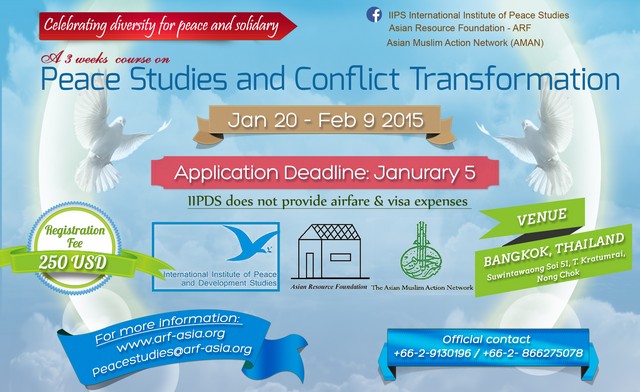By Hassanal Noor Rashid
The Conflict Transformation and Peace Studies course hosted by the International Institute of Peace Studies (IIPDS) in Bangkok, saw passionate individuals from various countries come together to share their ideas on how to realize a peaceful and sustainable future in a political-social environment that is plagued by constant conflict.
The three week course from the 19th January 2015 until the 10th February 2015 featured lectures by diverse and prominent lecturers who deliberated with the participants on topics such as Human Rights, Hegemony, Sustainable economies and a plethora of other topics essential for those interested in addressing the many issues in politics and society today.
Many of the participants hailed from different countries and very unique backgrounds. Among the countries represented were Indonesia, Malaysia, Philippines, Sri Lanka, Nepal, Argentina, Russia, United States of America, Rwanda, India and Pakistan. What is perhaps more interesting is that some of the participants have backgrounds which further add to the diverse nature of the participants.
For example, the participant from Rwanda is currently studying in Israel and is fairly familiar with the socio-culture landscape of the country. The American is studying in Japan and the Argentinean is furthering his studies in China.
From an academic standpoint, many disciplines within the arts and humanities such as International Relations, Sociology, Anthropology and so forth, have sought throughout modern history to document, study and understand the human condition and the ever-changing world order. What marks this particular course as distinguishable was the fact that it is not simply about understanding the state of the world today, but also developing a foundation to help envision a better future.
Peace, Development and Sustainability. These are the main themes that were to be drawn out of the three week course and laid out the foundation of what a truly sustainable and peaceful society means.
It is a natural assumption that peace and justice are synonymous, but as exemplified in the many debates and discussions throughout the course, these two concepts can contradict one another. The search for justice may not necessarily be peaceful and without violence, and inversely, the attainment for peace may not be without its own injustices and conflict. In the practical sense this is why in reality, human rights workers have tendencies to come into clashes with peace activists, both of whom have well-meaning intentions, but their goals and agendas contradict one another.
This is just one example of the many conundrums faced by peace activists and advocates for social justice. It highlights the delicate and complex nature of conflicts which plague many societies across the world and brings an understanding of why these conflicts require more grace in both their analysis and resolution.
The many unique incidents of injustices were highlighted from the respective individuals who represented their own countries and societies. Each had shared their own dilemmas, many of which were pronounced overt conflicts, and some were more subtle, with tensions being defined in the nuances of their societies.
This concept of sharing and engagement is arguably the most powerful methodology of courses such as this, as it offers an important tool for any activist academic, and student.
Perspective.
Ultimately a deeper understanding and appreciation of context and perspective is what drives the peace and sustainability movement forward. Through the cultivation of meaningful dialogue and discussion, an effective counter-narrative to the hateful bigotry and misinformation that pollutes the discourse can be developed.
This is what is special about the Peace Studies course offered by the IIPDS. It offers a crucial foundational understanding of the world today and an open forum to cultivate meaningful dialogue and discussion free from discrimination and bigotry.
Most importantly however, it is planting the seeds which may hopefully lead to sustainable peace, addressing the many ills brought about by a banal form of modernity, and bringing back new life to the understanding of the human condition.
Hassanal Noor Rashid is the Program Coordinator of the International Movement for a Just World (JUST)
3 March 2015

